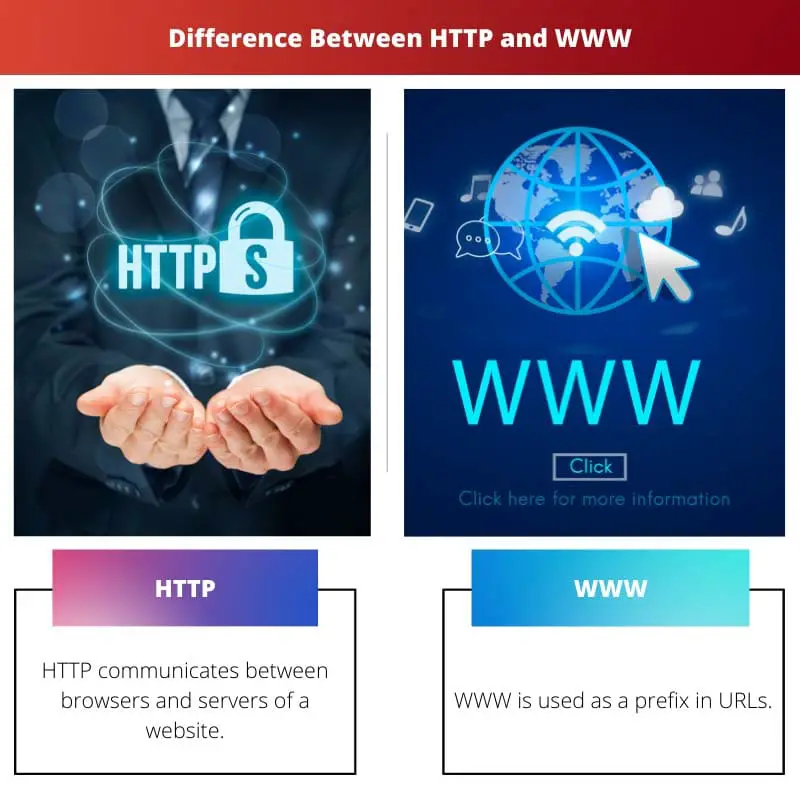HTTP and WWW are two different acronyms used in day-to-day browsing activities. Precisely, the Uniform resource locator is where these acronyms come in handy.
Key Takeaways
- HTTP is a protocol that governs how data is transmitted over the internet. At the same time, WWW stands for the World Wide Web, a system of interconnected documents and resources accessed through the internet.
- HTTP transfers data between a client and a server, while WWW is used to access web pages and other resources on the internet.
- HTTP is the WWW’s foundation; without it, the web as we know it would not exist.
HTTP vs. WWW
HTTP and WWW differ because the latter is used as a URL prefix. HTTP communicates between browsers and servers of a website. Also, HTTP transports data from one machine source to another online.

Hypertext Transfer Protocol (HTTP) is a language that communicates between browsers and servers of a website. It defines the way messages are sent and formatted in a web browser.
World Wide Web (WWW) acts as a prefix to the HTTP protocol. It is a set of linked hypertext records viewed on Chrome, Firefox, and other search engines. Also, it identifies a specific address as a website.
Comparison Table
| Parameters of Comparison | HTTP | WWW |
|---|---|---|
| Significance | HTTP communicates between browsers and servers of a website. Also, HTTP transports data from one machine source to another online. | WWW is used as a prefix in URLs. |
| Full form | HTTP stands for Hypertext Transfer Protocol. | WWW stands for World Wide Web. |
| Necessity | Using HTTP in a URL is not mandatory while creating or reaching out to it. | Regarding Search Engine Optimization, it is essential to use a WWW domain. |
| Mutual Relationship | Hypertext Transfer Protocol (HTTP) is a language that communicates between browsers and servers of a website. | World Wide Web (WWW) acts as a prefix to the HTTP protocol. |
| Ports used | HTTPS uses 483 ports for encryption and decryption of data, whereas HTTP uses 80 ports to function. | World Wide Web can act as a domain and a sub-domain that can operate with or without HTTP. |
What is HTTP?
Hypertext Transfer Protocol (HTTP) is a language that communicates between browsers and servers of a website. It defines the way messages are sent and formatted in a web browser.
HTTP is a way to make a connection(s) that also secures data transfer. It serves text documents and binary files and makes client-server connections feasible.
It ensures that the client-server communication is encrypted over SSL. Also, HTTPS uses 483 ports for the encryption and decryption of data. The primary use of HTTPS comes into action while doing online transactions by any mode of payment.

What is WWW?
World Wide Web (WWW) acts as a prefix to the HTTP protocol. It is a set of linked hypertext records viewed on Chrome, Firefox, and other search engines.
When it comes down to Search Engine Optimization (SEO), it isn’t essential to have a WWW domain. One can use a non-WWW environment to run a website.
Also, it can be used throughout with some exceptional exception cases. WWW has no technical purpose, and a website can also work without it. Almost all WWW browsers can use other protocols except HTTP.

Main Differences Between HTTP and WWW
- Hypertext Transfer Protocol (HTTP) is a language that communicates between browsers and servers of a website, whereas the World Wide Web (WWW) acts as a prefix to the HTTP protocol most of the time.
- HTTPS uses 483 ports for encryption and decryption of data, whereas HTTP uses 80 ports to function. On the other hand, World Wide Web can act as a domain and a sub-domain that can operate with or without HTTP.


I have to disagree with some of the points made in the article. I believe that WWW is more significant than HTTP, especially when considering web traffic.
The details about HTTP’s use of ports vs. WWW as a domain were quite informative. Well explained!
Great explanation on the differences between HTTP and WWW. I now understand why they’re used differently.
I never knew the technical purposes of HTTPS and the differences in ports. Very informative.
This article made an important distinction between HTTP and WWW, though I wish it included more information on the technical details.
I appreciate the comparison table on HTTP and WWW. It’s a helpful way to visually understand their differences.
The explanations were very clear and easy to understand. This article has expanded my knowledge on HTTP and WWW.
The humorous tone in some sections made this technical read quite amusing. Well done!
I didn’t realize that the WWW isn’t essential to use when running a website. It’s good to know.
The article only focused on HTTP and WWW, yet I wish it had delved into other foundational internet concepts.